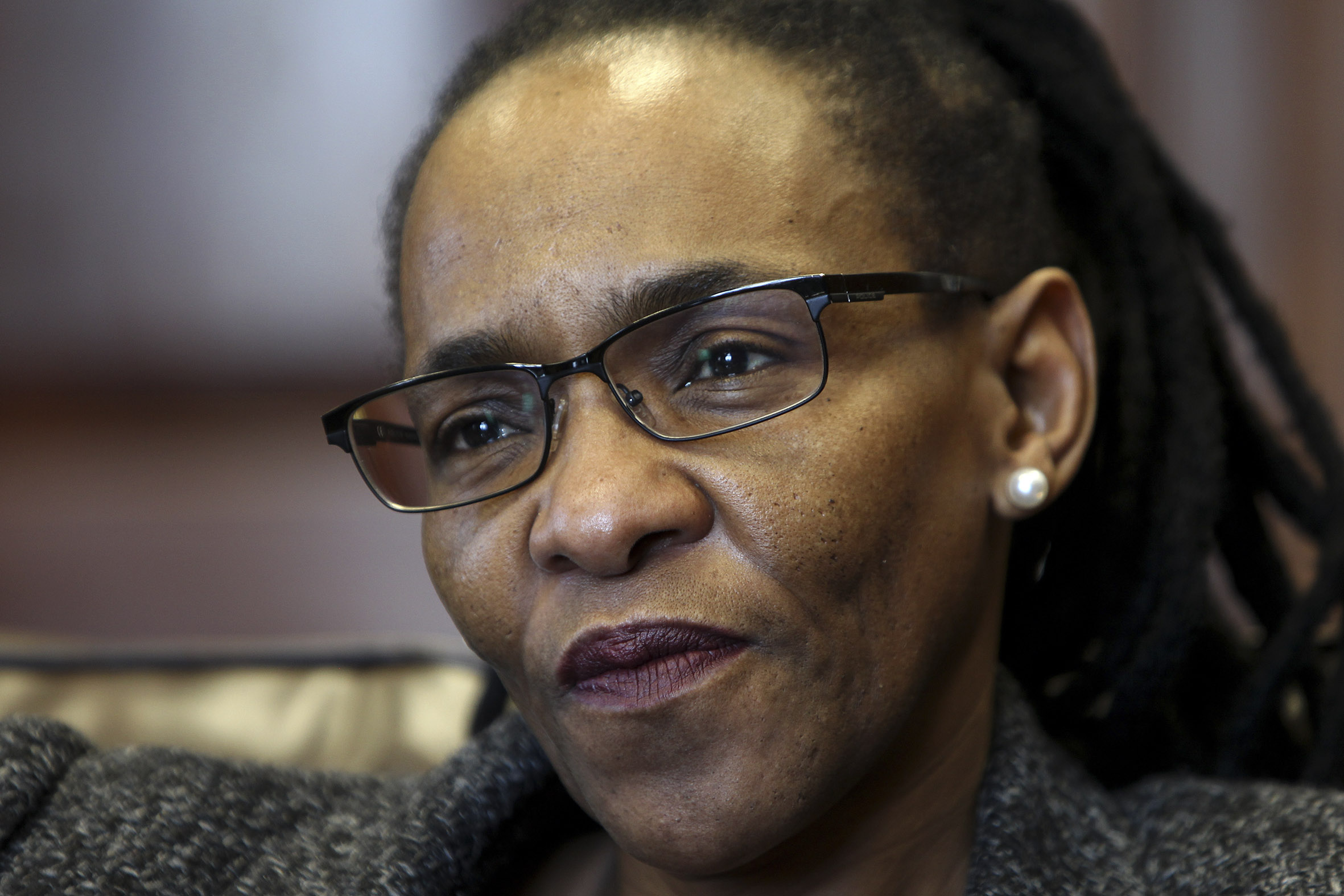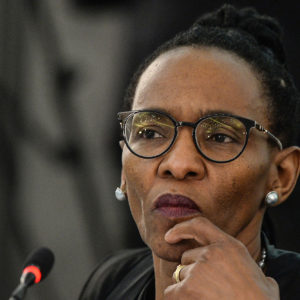The JSC has always had a sexism problem
The recent Judicial Service Commission interviews for the chief justice position have been widely slated as misogynistic – but this is nothing new for a judicial body generally hostile to women.
Author:
15 February 2022

Over the past few days, there have been whispers of the Judicial Service Commission (JSC) failing to meet its mandate. This failure has been attributed to the behaviour of certain commissioners, but it takes only a short dive into past JSC interviews to come to the conclusion that what the JSC is being accused of – in this specific case, sexism – is nothing new. While the sexist behaviour may be attributed to certain commissioners, one should also not make the mistake of thinking that replacing these commissioners will change the JSC’s attitude to women judges.
This is not to say that the JSC did not have a lot of work to do given the state of the judiciary at the formal end of apartheid. Of the 165 judges in April 1994, only two were women. Neither of the women judges was Black, and one of them had been appointed by the apartheid government as it departed.
Related article:
Since then, there has been some progress, albeit not rapid enough. As of 2017, there were 87 permanent women judges out of 246 positions. Despite this progress, it is unacceptable for women to represent only 35% of permanent judges in a country where women form more than half the population and which produces decidedly more women law graduates than men.
Sadly, this is a reflection of most leadership positions in the legal profession. Out of the 2 915 advocates registered at 11 Bars in 2017, only 27% were women. This is important to note because the Bar is the preferential arena from which the JSC recommends judges for appointment. While a number of factors contribute to the lack of women judges on the bench, one could argue the JSC plays a major gatekeeping role. On paper, it would appear from the way the JSC has recommended the brilliant President of the Supreme Court of Appeal Mandisa Maya for the chief justice position that the commission is progressive and pro-women, but watching the interviews suggests otherwise.
A history of sexism
In fact, watching the JSC interviews of women judges over the years would make a young woman lawyer despondent. As we saw, even a judge as senior as Maya was not spared sexual innuendos. No JSC commissioner denounced the crass and inappropriate joke Advocate Dali Mpofu made about the two spending a night together – they had pulled an all-nighter studying – and women viewers were made to squirm, wondering whether they were overreacting as they listened to the laughter in the room. It was so loud, in fact, that some likely missed Maya’s request for the “joke” to be clarified.
Although the appointment of judges is reserved for the president of the country, the JSC plays a pivotal role in vetting and recommending candidates, so the JSC’s process is very important. The commission’s sexist attitude did not sprout overnight. Quite the contrary, one can even go back to the interview of retired Justice Kate O’Regan, one of the first two women to sit on the Constitutional Court, to see this sexist attitude on display. In her interview, O’Regan was asked whether she would be able to make adequate arrangements for her children’s care should she be appointed. Needless to say, child care is not one of the JSC’s concerns when it comes to male judges, despite several of them being fathers.
Related article:
Not too many years later, the JSC presided over Advocate Anna-Marie de Vos’s interview to become deputy judge president. Instead of focusing on De Vos’s long list of achievements, the then judge president, Bernard Ngoepe, said her attitude displeased him. This was after she asked Ngoepe why she had not been given an acting stint as deputy judge president to prepare for the promotion as her competitor had, despite them both being promised the role. In the interview, De Vos said her opponent had, as a result of the broken promise, an advantage over her since his experience would now count towards the promotion. And she was right; the competitor indeed received the promotion. De Vos was not given an opportunity her male competitor was given and then she also paid the price for trying to reclaim what was promised to her. Damned if you do, damned if you don’t. This is the price for being a woman in the judiciary.
And the JSC did not stop there. De Vos is not only a woman, she was then also the only openly lesbian judge on the Pretoria bench. For this, she paid a price too. She was asked how her colleagues (all of them male, of course) related to her, and whether her partner not being a man was a “hindrance”. The question, blatantly homophobic despite the Constitution’s assertion that no one should be discriminated against based on sexual orientation, did not cause a stir among the commissioners. No one uttered any objection to De Vos’s shameful treatment.
Patriarchal structures
Around the same time, the sexist JSC struck again, in legal scholar Penelope Andrews’s interview for a position at the Constitutional Court. Andrews was then working in New York and a commissioner asked her whether anything would make her come back to South Africa, in the event she were not appointed. Without missing a beat, another commissioner chimed in to tell her to “get a boyfriend” in the country – as if women can only ever be tied down in servitude to men.
A reader could stop me now and say, “But, Tanveer, this was back in 2005. So much has changed. You cannot judge the JSC on how it acted then,” and to this I would reply, “So let us judge them on what is happening now.”
Not even four years ago, in 2019, we saw the JSC’s flippant treatment of Justice Fayeeza Kathree-Setiloane. It was put to her, at the end of her interview, that “even the tenor of [her] voice, just [her] manner of speech, at best comes across to [the commissioner] as a little overbearing”. Those who follow JSC interviews will know that, on more than one occasion, debates have escalated among men during interviews, and men have lost their temper, even shouting and screaming at each other, but the JSC seems to draw the line at a woman gesturing and speaking in a direct manner. Clearly, a woman should not be heard. She should speak when spoken to – God forbid she be assertive.
I am sure that there are more, similar instances, but I believe that these few make the point. Maya’s recent interview has been hashed out at length, and expertly so. I do not wish to go over it again, save to say that the JSC took from us an opportunity to see Maya shine. She came in, ready to tackle all the misguided impressions that anyone might have had of her, whether because of her race or her gender. Her opening statement sparkled. Yet, between the sexual innuendos and the fawning over her being an exceptional woman – as opposed to an exceptional judge (a distinction she had to point out) – we were all reminded that the issue is not in us being women, but rather in what a patriarchal society thinks this means.
I take this moment to celebrate the brilliance and tenacity of Maya and all the indefatigable women in the judiciary, for all they have achieved and, I have no doubt, will keep achieving. She is the chief justice we deserve: a strong-willed and intellectual judge who will not baulk at the challenges that lie ahead of her.
She has tamed a much wilder beast in the form of the Supreme Court of Appeal, and, should she be appointed, I have no doubt that the initiatives she will put into place will bring much-needed change to the Constitutional Court and the judiciary at large.
I know that regardless of her appointment, she will always champion the fight for gender equality. Yet, I also take this moment to speak to other women lawyers, to sound a rallying cry to them. Do not let the JSC’s treatment of women judges dissuade you from having judicial aspirations. Just as it took days for outrage to be expressed regarding the more subtle vestiges of sexist attitudes shown in Maya’s interview, it will take decades to implement change in the legal profession.
A seat at the table
We should urge the JSC to formally adopt a list of criteria that it ought to consider in its selection process. As it stands, there are no known adopted criteria for the JSC, and this makes it easier for commissioners to ask questions that are completely unrelated to the applicant’s fitness and eligibility for the appointment. This enables rampant sexism and has created a culture of fear of the JSC – a commission from which, under these conditions, one cannot expect legitimacy. For many lay people, the interviews were a farce.
But the truth of the matter is not funny. Real people sit in these interviews, and women in the legal profession are taking note of the way their seniors are treated. I personally know of many women colleagues whose judicial aspirations have been all but extinguished because they are afraid of being humiliated, laughed at and harassed on live television. Women lawyers, wherever they may be, are all too familiar with being condescended to, as if they were five-year-olds, as opposed to professionals who had to work twice as hard as their male counterparts to earn their qualifications and experience, only to be given a kiddies seat at the boys’ club’s oak table.
Related article:
Pius Langa, chief justice between 2005 and 2009, recognised the significance of a judiciary characterised by “a white unwelcoming face with Black victims at the receiving end of unjust laws administered by courts alien and generally hostile to them”. I would add that this is very much the same for women in the judiciary.
I remember questions from the bench during an important sexual assault case that proved most male judges in the courtroom that day were blissfully unaware of the effects of such crimes on women. I do not need to highlight the importance of representation of women on the bench, but I will emphasise what many fail to consider: the JSC’s treatment of the women judges during interviews signals to the legal profession that women do not belong anywhere near it.



